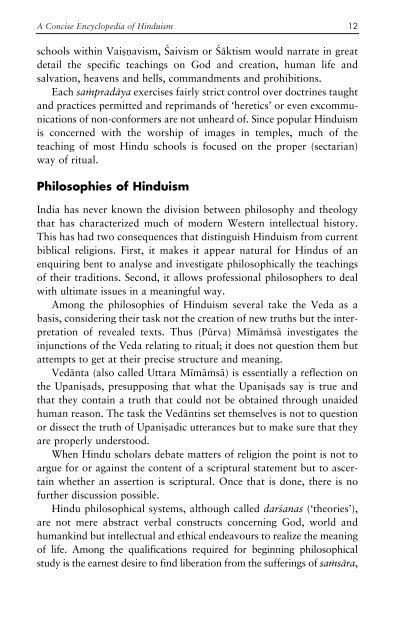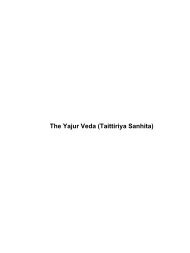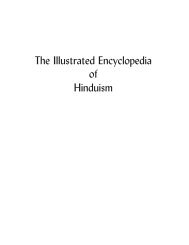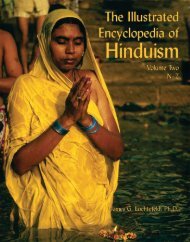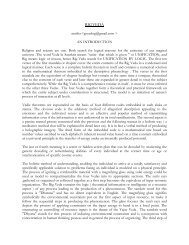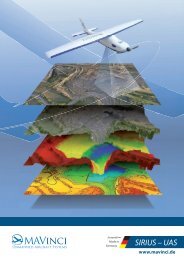A Concise Encyclopedia of Hinduism Klaus K Klostermaie
Create successful ePaper yourself
Turn your PDF publications into a flip-book with our unique Google optimized e-Paper software.
A <strong>Concise</strong> <strong>Encyclopedia</strong> <strong>of</strong> <strong>Hinduism</strong> 12<br />
schools within Vai•æavism, Ÿaivism or Ÿäktism would narrate in great<br />
detail the specific teachings on God and creation, human life and<br />
salvation, heavens and hells, commandments and prohibitions.<br />
Each saƒpradäya exercises fairly strict control over doctrines taught<br />
and practices permitted and reprimands <strong>of</strong> ‘heretics’ or even excommunications<br />
<strong>of</strong> non-conformers are not unheard <strong>of</strong>. Since popular <strong>Hinduism</strong><br />
is concerned with the worship <strong>of</strong> images in temples, much <strong>of</strong> the<br />
teaching <strong>of</strong> most Hindu schools is focused on the proper (sectarian)<br />
way <strong>of</strong> ritual.<br />
Philosophies <strong>of</strong> <strong>Hinduism</strong><br />
India has never known the division between philosophy and theology<br />
that has characterized much <strong>of</strong> modern Western intellectual history.<br />
This has had two consequences that distinguish <strong>Hinduism</strong> from current<br />
biblical religions. First, it makes it appear natural for Hindus <strong>of</strong> an<br />
enquiring bent to analyse and investigate philosophically the teachings<br />
<strong>of</strong> their traditions. Second, it allows pr<strong>of</strong>essional philosophers to deal<br />
with ultimate issues in a meaningful way.<br />
Among the philosophies <strong>of</strong> <strong>Hinduism</strong> several take the Veda as a<br />
basis, considering their task not the creation <strong>of</strong> new truths but the interpretation<br />
<strong>of</strong> revealed texts. Thus (Pürva) Mïmäƒsä investigates the<br />
injunctions <strong>of</strong> the Veda relating to ritual; it does not question them but<br />
attempts to get at their precise structure and meaning.<br />
Vedänta (also called Uttara Mïmäƒsä) is essentially a reflection on<br />
the Upani•ads, presupposing that what the Upani•ads say is true and<br />
that they contain a truth that could not be obtained through unaided<br />
human reason. The task the Vedäntins set themselves is not to question<br />
or dissect the truth <strong>of</strong> Upani•adic utterances but to make sure that they<br />
are properly understood.<br />
When Hindu scholars debate matters <strong>of</strong> religion the point is not to<br />
argue for or against the content <strong>of</strong> a scriptural statement but to ascertain<br />
whether an assertion is scriptural. Once that is done, there is no<br />
further discussion possible.<br />
Hindu philosophical systems, although called darÿanas (‘theories’),<br />
are not mere abstract verbal constructs concerning God, world and<br />
humankind but intellectual and ethical endeavours to realize the meaning<br />
<strong>of</strong> life. Among the qualifications required for beginning philosophical<br />
study is the earnest desire to find liberation from the sufferings <strong>of</strong> saƒsära,


